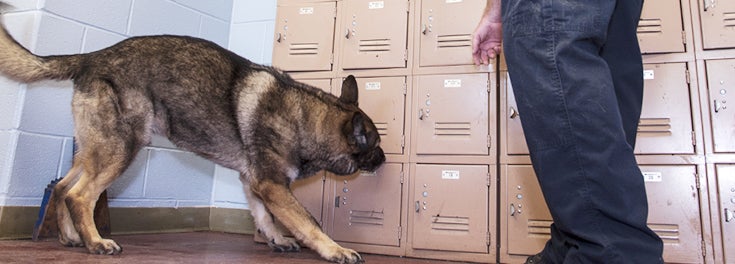
Just about everyone loves dogs, and many people find explosions pretty fascinating, right? Well, these two interests could lead a person to a career in chemistry or forensics. A person like Jonathan Canino, for example, who earned his bachelor’s degree in chemistry at URI and is now doing graduate research on how to help dogs detect explosives. And just a few months ago, his presentation on “Safe Training Aids for Bomb-Sniffing Dogs” captured the title of first place in the eighth annual National Security Innovation Competition – and a $10,000 prize.
Jonathan is pursuing his doctorate in chemistry, but exciting and important research opportunities are open to undergraduate and graduate students alike in Chemistry Professor Jimmie Oxley’s Lab.
A number of outstanding students have worked on this project over the last decade, and Jon has perfected the third generation of these training aids. I am hoping the next student will see it to the marketplace. We’re almost there. ~Professor Jimmie Oxley
As co-director of the Department of Homeland Security Center of Excellence in Explosives, Professor Oxley involves her students directly in her work on some of society’s biggest security issues, from researching airport and other transportation terminal security to testing explosives detection equipment under development by private companies. In projects related to gathering explosion-related evidence, students explore how long chemicals used in explosives remain in clothing and hair, the nature of pipe bomb explosions, explosive components, and more.
The work you do in Professor Oxley’s lab isn’t just practical for addressing today’s global security issues, it’s also practical experience for entering the workforce. The National Homeland Defense Foundation sponsors the National Security Innovation Competition. “These students are the future of the workplace and are already developing amazing innovations,” said Lt. Gen. Ed Anderson, president of the National Homeland Defense Foundation.
“We were surprised and pleased,” Professor Oxley said of Jonathan’s first-place finish. “A number of outstanding students have worked on this project over the last decade, and Jon has perfected the third generation of these training aids. I am hoping the next student will see it to the marketplace. We’re almost there.”
Jonathan’s success is not unusual at URI. He was one of three URI students who recently captured national championships in their particular disciplines. In April, Bianca Peixoto was crowned champion at the National Collegiate Soils Competition. Shortly after, URI computer engineering students and their autonomous model race car won first place in the national Freescale Cup competition and are representing the United States in an upcoming world championship.
With faculty eager to work alongside undergraduate and graduate students, maybe you can be the next Jonathan. Or Bianca. Or national champion in whatever interests you most.
